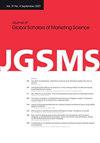Does gamification effect customer brand engagement and co-creation during pandemic? A moderated-mediation analysis
IF 2.7
Q3 BUSINESS
Journal of Global Scholars of Marketing Science
Pub Date : 2022-07-21
DOI:10.1080/21639159.2022.2083000
引用次数: 9
Abstract
ABSTRACT While insight into gamification, customer brand engagement (CBE), and co-creation is rapidly increasing, little remains known about the relationship of these, and related concepts, as thus investigated in this study. Rooted in service-dominant logic and protection motivation theory-informed perspectives, this study develops and tests a model which investigates the effects of destination brand-based gamification on CBE, co-creation, loyalty and positive word-of-mouth (WOM) during pandemic. This study also investigates the potentially moderating role of protection motivation and psychological fear in affecting these associations. To explore these issues, we collected tourist-based survey data using PLS-SEM analysis. Our findings suggest that gamification positively impacts CBE, co-creation, loyalty and WOM. Second, our findings confirm the CBE’s differing effects on co-creation, loyalty and WOM. Third, results revealed the gamification’s indirect effect on co-creation, loyalty and WOM, as mediated through CBE. Further, findings verify a reciprocal relationship between loyalty and CBE, which has not been reported in existing studies. Finally, our analyses revealed a significant-positive moderating role of protection motivation and significant-negative moderating effect of psychological fear in proposed associations. This study offers key theoretical and practical implications to marketing literature with valuable suggestions for destination brand managers during pandemic.在疫情期间,游戏化是否会影响客户的品牌参与和共同创造?适度调解分析
摘要尽管对游戏化、客户品牌参与(CBE)和共同创造的了解正在迅速增加,但正如本研究所调查的那样,对这些和相关概念之间的关系知之甚少。本研究植根于服务主导逻辑和保护动机理论的知情视角,开发并测试了一个模型,该模型调查了疫情期间基于目的地品牌的游戏化对CBE、共创、忠诚度和正面口碑的影响。本研究还调查了保护动机和心理恐惧在影响这些关联中的潜在调节作用。为了探讨这些问题,我们使用PLS-SEM分析收集了基于游客的调查数据。我们的研究结果表明,游戏化对CBE、共创、忠诚度和口碑有积极影响。其次,我们的研究结果证实了CBE对共创、忠诚度和口碑的不同影响。第三,研究结果揭示了游戏化对共同创造、忠诚度和口碑的间接影响,这是通过CBE介导的。此外,研究结果证实了忠诚度和CBE之间的互惠关系,这在现有研究中尚未报道。最后,我们的分析揭示了保护动机在所提出的联想中的显著正向调节作用和心理恐惧的显著负向调节作用。这项研究为营销文献提供了关键的理论和实践启示,并为疫情期间的目的地品牌经理提供了宝贵的建议。
本文章由计算机程序翻译,如有差异,请以英文原文为准。
求助全文
约1分钟内获得全文
求助全文

 求助内容:
求助内容: 应助结果提醒方式:
应助结果提醒方式:


